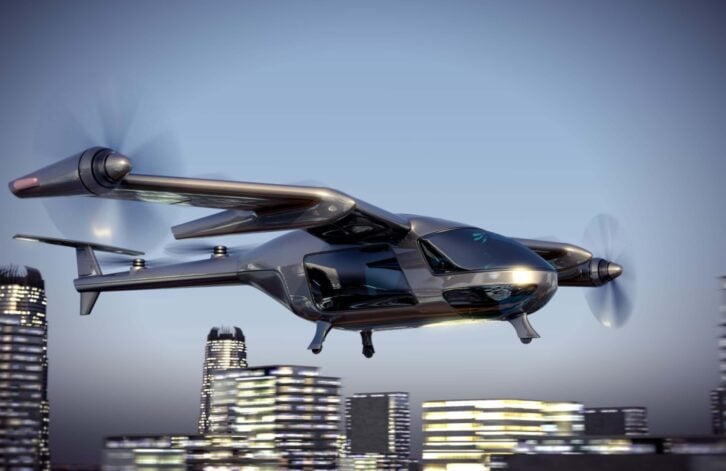The UK government’s ambitious plans for the future of flight have been called “overly optimistic” by an expert, who says the idea we will have flying taxis by 2026 should be treated with “healthy scepticism”.
Yesterday, the Department for Transport announced a roadmap that the government hopes would see the first piloted flying taxi flight by 2026 and regular services by 2028. The plan also aims to have regular drone deliveries across our skies by 2027 and demos of autonomous flying taxis without pilots on board by 2030.
Announcing the Future of Flight action plan, aviation and technology minister Anthony Browne said in a statement: “Cutting-edge battery technology will revolutionise transport as we know it – this plan will make sure we have the infrastructure and regulation in place to make it a reality.”
Browne added: “From flying taxis to emergency service drones, we’re making sure the UK is at the forefront of this dramatic shift in transportation – improving people’s lives and boosting the economy.”
However, a drone expert has poured cold water on the government’s lofty ambitions, calling the timeframes suggested unrealistic.
“I’ve spent more than a decade watching companies and governments announce, with great confidence and certainty, that flying taxis and medical emergency drones are three to five years away from becoming an everyday reality,” said Arthur Holland Michel, a senior fellow at Carnegie Council for Ethics in International Affairs, and the author of a 2019 book on drones.
Holland Michel believes that the plans announced by the government will miss the short timescales for several reasons. “In reality, even though drone technology has improved a lot over recent years, there continues to be a raft of tangled questions that would need to be answered before drones start whipping about our skies en masse carrying organs and medical supplies, let alone living human passengers,” he said.
Key among them include major unanswered questions over drone regulation for such high-profile, high-risk flights such as transporting humans. But even if the regulatory issue could be solved quickly – something unlikely given the government’s febrile hold on power at present, and with an election likely later this year – there are still significant infrastructural issues that would have to be resolved.
“For example, where will we fit their landing pads in our already congested urban spaces? How could one build enough of these pads within five years for aerial taxis to be as versatile as a ground taxi, which can pick you up and drop you off on any transitable road? Where will we charge them? What happens if they experience a technical failure? Or if they catch fire? How would we prevent them from being hacked?” asks Holland Michel. “The list goes on.”
Will flying taxis take off?
An agreement to build the UK’s first vertiport testbed, from which flying electric taxi startup Vertical Aerospace – which completed its first test flight without any humans onboard in July 2023 – would launch its taxis, was only signed earlier this month.
The vertiport, built by Skyports Infrastructure at Bicester Motion, Oxfordshire, hopes to be operational by the end of 2024. If that happened, it would mean the air mobility sector has met only part of the short-term roadmap outlined by the Advanced Mobility Ecosystem Consortium (AMEC), which suggested a number of “smaller strategically located Vertiports across the country” would be created by 2025.
Given timing has already slipped, the government’s plans to have the first flight within two years, and regular services within four, seem ambitious. And plans for a trial of drone flights to deliver medical supplies between hospitals in Northumberland have been opposed by the Ministry of Defence, who worry flights will affect the country’s defence capabilities.
However, plans for a 164-mile “automated drone superhighway” first announced in July 2022 appear to be on track to be delivered within an announced two-year timeframe. Work is set to be completed by May.
“There’s no penalty for a government or a company that makes an overly optimistic promise like this,” said Holland Michel. “Everyone does it. With each bold announcement like this, there’s a brief media frenzy. And then, in 2028, when we still don’t have flying taxis all over the place, nobody will look back at this day and say ‘Well, they misled us.’”
However, Holland Michel offers some advice when encountering such government announcements. “When it comes to drone tech, especially drone tech for carrying precious cargo over urban spaces, a little healthy scepticism goes a very long way.”
The post UK plans for flying taxis by 2026 pie in the sky, expert says appeared first on UKTN.


